Maven
Get verified solutions from MAVEN, here you get verified academic materials with updated solutions in various academic fields experience . and you will find everything you need in NURSING EXAMS AND TESTBANKS.REACH US OUT, to fetch it for you in minutes if we do not have it in this shop.!!!!Always leave a review after purchasing any document so as to make sure our customers are 100% satisfied.
- 478
- 0
- 0
Community
- Followers
- Following
478 items
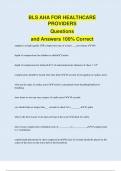
BLS AHA FOR HEALTHCARE PROVIDERS Questions and Answers 100% Correct
emphasis on high-quality CPR compression rate of at least ___ per minute.100 depth of compressions for children to adult2 inches depth of compression for infants1/3 of anterior/posterior diameter of chest. 1 1/2" compressions should be started what time limit?10 seconds of recognition of cardiac arrest. what are the signs of cardiac arrest?victim is unresponsive/not breathing/ineffective breathing time frame to start cpr once suspect of cardia arrest?10 seconds. you should take no longe...
- Exam (elaborations)
- • 8 pages •
emphasis on high-quality CPR compression rate of at least ___ per minute.100 depth of compressions for children to adult2 inches depth of compression for infants1/3 of anterior/posterior diameter of chest. 1 1/2" compressions should be started what time limit?10 seconds of recognition of cardiac arrest. what are the signs of cardiac arrest?victim is unresponsive/not breathing/ineffective breathing time frame to start cpr once suspect of cardia arrest?10 seconds. you should take no longe...
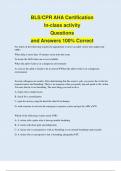
BLS/CPR AHA Certification In-class activity Questions and Answers 100% Correct
For which of the following would it be appropriate to move an adult victim who might need CPR? When help is more than 15 minutes away from the scene To locate the AED when one is not available When the adult victim is in a dangerous environment As soon as the adult is found to be in arrestWhen the adult victim is in a dangerous environment Several colleagues are nearby. After determining that the scene is safe, you assess the victim for responsiveness and breathing. There is no respon...
- Exam (elaborations)
- • 14 pages •
For which of the following would it be appropriate to move an adult victim who might need CPR? When help is more than 15 minutes away from the scene To locate the AED when one is not available When the adult victim is in a dangerous environment As soon as the adult is found to be in arrestWhen the adult victim is in a dangerous environment Several colleagues are nearby. After determining that the scene is safe, you assess the victim for responsiveness and breathing. There is no respon...
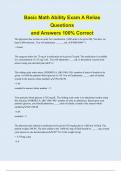
Basic Math Ability Exam A Relias Questions and Answers 100% Correct
The physician has written an order for a medication, 3,000 units to be given SQ. You have on hand 5,000 units/mL. You will administer _______mL.3000/5000 *1 = 0.6mL The surgeon orders for 75 mg of a medication to be given IV push. The medication is available in a concentration of 125 mg/2 mL. You will administer ____mL to the patient. (record your answer using one decimal place)1.2 The sliding scale order states: [FORMULA: (BG-100)÷30]= number of units of insulin to be given. At 160...
- Exam (elaborations)
- • 5 pages •
The physician has written an order for a medication, 3,000 units to be given SQ. You have on hand 5,000 units/mL. You will administer _______mL.3000/5000 *1 = 0.6mL The surgeon orders for 75 mg of a medication to be given IV push. The medication is available in a concentration of 125 mg/2 mL. You will administer ____mL to the patient. (record your answer using one decimal place)1.2 The sliding scale order states: [FORMULA: (BG-100)÷30]= number of units of insulin to be given. At 160...

Basic Dysrhythmia study guide - test 2 Questions and Answers 100% Correct
Know how to measure the PR interval ( PRI)From where the P wave begins until the beginning of the QRS complex. 0.12 to 0.20 seconds (3 to 5 small boxes) in adults, longer in elderly people. Know how to measure the QRSFrom the end of the PR interval to the end of the S wave. 0.08 to 0.10 seconds. (2-2 1/2 boxes) Know the normal values for the PRI and the QRSPRI = 0.12 - 0.20 or 3-5 boxes QRS = 0.08 - 0.10 or 2- 2 1/2 boxes Know what electrical activity triggers which mechanical event. F...
- Exam (elaborations)
- • 3 pages •
Know how to measure the PR interval ( PRI)From where the P wave begins until the beginning of the QRS complex. 0.12 to 0.20 seconds (3 to 5 small boxes) in adults, longer in elderly people. Know how to measure the QRSFrom the end of the PR interval to the end of the S wave. 0.08 to 0.10 seconds. (2-2 1/2 boxes) Know the normal values for the PRI and the QRSPRI = 0.12 - 0.20 or 3-5 boxes QRS = 0.08 - 0.10 or 2- 2 1/2 boxes Know what electrical activity triggers which mechanical event. F...

Basic Dysrhythmia study guide - test 2 Questions and Answers 100% Correct
Know how to measure the PR interval ( PRI)From where the P wave begins until the beginning of the QRS complex. 0.12 to 0.20 seconds (3 to 5 small boxes) in adults, longer in elderly people. Know how to measure the QRSFrom the end of the PR interval to the end of the S wave. 0.08 to 0.10 seconds. (2-2 1/2 boxes) Know the normal values for the PRI and the QRSPRI = 0.12 - 0.20 or 3-5 boxes QRS = 0.08 - 0.10 or 2- 2 1/2 boxes Know what electrical activity triggers which mechanical event. F...
- Exam (elaborations)
- • 3 pages •
Know how to measure the PR interval ( PRI)From where the P wave begins until the beginning of the QRS complex. 0.12 to 0.20 seconds (3 to 5 small boxes) in adults, longer in elderly people. Know how to measure the QRSFrom the end of the PR interval to the end of the S wave. 0.08 to 0.10 seconds. (2-2 1/2 boxes) Know the normal values for the PRI and the QRSPRI = 0.12 - 0.20 or 3-5 boxes QRS = 0.08 - 0.10 or 2- 2 1/2 boxes Know what electrical activity triggers which mechanical event. F...
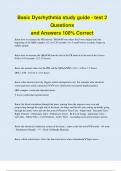
Basic Dysrhythmia study guide - test 2 Questions and Answers 100% Correct
Know how to measure the PR interval ( PRI)From where the P wave begins until the beginning of the QRS complex. 0.12 to 0.20 seconds (3 to 5 small boxes) in adults, longer in elderly people. Know how to measure the QRSFrom the end of the PR interval to the end of the S wave. 0.08 to 0.10 seconds. (2-2 1/2 boxes) Know the normal values for the PRI and the QRSPRI = 0.12 - 0.20 or 3-5 boxes QRS = 0.08 - 0.10 or 2- 2 1/2 boxes Know what electrical activity triggers which mechanical event. F...
- Exam (elaborations)
- • 3 pages •
Know how to measure the PR interval ( PRI)From where the P wave begins until the beginning of the QRS complex. 0.12 to 0.20 seconds (3 to 5 small boxes) in adults, longer in elderly people. Know how to measure the QRSFrom the end of the PR interval to the end of the S wave. 0.08 to 0.10 seconds. (2-2 1/2 boxes) Know the normal values for the PRI and the QRSPRI = 0.12 - 0.20 or 3-5 boxes QRS = 0.08 - 0.10 or 2- 2 1/2 boxes Know what electrical activity triggers which mechanical event. F...
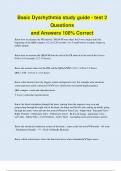
Basic Dysrhythmia study guide - test 2 Questions and Answers 100% Correct
Know how to measure the PR interval ( PRI)From where the P wave begins until the beginning of the QRS complex. 0.12 to 0.20 seconds (3 to 5 small boxes) in adults, longer in elderly people. Know how to measure the QRSFrom the end of the PR interval to the end of the S wave. 0.08 to 0.10 seconds. (2-2 1/2 boxes) Know the normal values for the PRI and the QRSPRI = 0.12 - 0.20 or 3-5 boxes QRS = 0.08 - 0.10 or 2- 2 1/2 boxes Know what electrical activity triggers which mechanical event. F...
- Exam (elaborations)
- • 3 pages •
Know how to measure the PR interval ( PRI)From where the P wave begins until the beginning of the QRS complex. 0.12 to 0.20 seconds (3 to 5 small boxes) in adults, longer in elderly people. Know how to measure the QRSFrom the end of the PR interval to the end of the S wave. 0.08 to 0.10 seconds. (2-2 1/2 boxes) Know the normal values for the PRI and the QRSPRI = 0.12 - 0.20 or 3-5 boxes QRS = 0.08 - 0.10 or 2- 2 1/2 boxes Know what electrical activity triggers which mechanical event. F...
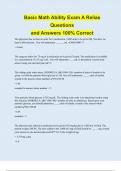
Basic Math Ability Exam A Relias Questions and Answers 100% Correct
The physician has written an order for a medication, 3,000 units to be given SQ. You have on hand 5,000 units/mL. You will administer _______mL.3000/5000 *1 = 0.6mL The surgeon orders for 75 mg of a medication to be given IV push. The medication is available in a concentration of 125 mg/2 mL. You will administer ____mL to the patient. (record your answer using one decimal place)1.2 The sliding scale order states: [FORMULA: (BG-100)÷30]= number of units of insulin to be given. At 160...
- Exam (elaborations)
- • 4 pages •
The physician has written an order for a medication, 3,000 units to be given SQ. You have on hand 5,000 units/mL. You will administer _______mL.3000/5000 *1 = 0.6mL The surgeon orders for 75 mg of a medication to be given IV push. The medication is available in a concentration of 125 mg/2 mL. You will administer ____mL to the patient. (record your answer using one decimal place)1.2 The sliding scale order states: [FORMULA: (BG-100)÷30]= number of units of insulin to be given. At 160...
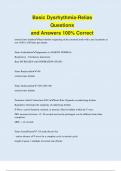
Basic Dysrhythmia-Relias Questions and Answers 100% Correct
normal sinus rhythmheart rhythm originating in the sinoatrial node with a rate in patients at rest of 60 to 100 beats per minute Sinus ArrhythmiaAppearance is ALMOST NORMAL: Respiratory - Circulatory interaction Rate INCREASES with INSPIRATION (IN=IN) Sinus Bradycardia<60 normal sinus rhythm Sinus Tachycardia>100 (100-150) normal sinus rhythm Premature Atrial Contraction (PAC)Heart Rate: Depends on underlying rhythm Regularity: Interrupts the regularity of underlying rhythm P-W...
- Exam (elaborations)
- • 4 pages •
normal sinus rhythmheart rhythm originating in the sinoatrial node with a rate in patients at rest of 60 to 100 beats per minute Sinus ArrhythmiaAppearance is ALMOST NORMAL: Respiratory - Circulatory interaction Rate INCREASES with INSPIRATION (IN=IN) Sinus Bradycardia<60 normal sinus rhythm Sinus Tachycardia>100 (100-150) normal sinus rhythm Premature Atrial Contraction (PAC)Heart Rate: Depends on underlying rhythm Regularity: Interrupts the regularity of underlying rhythm P-W...
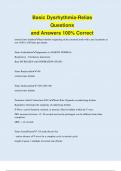
Basic Dysrhythmia-Relias Questions and Answers 100% Correct
normal sinus rhythmheart rhythm originating in the sinoatrial node with a rate in patients at rest of 60 to 100 beats per minute Sinus ArrhythmiaAppearance is ALMOST NORMAL: Respiratory - Circulatory interaction Rate INCREASES with INSPIRATION (IN=IN) Sinus Bradycardia<60 normal sinus rhythm Sinus Tachycardia>100 (100-150) normal sinus rhythm Premature Atrial Contraction (PAC)Heart Rate: Depends on underlying rhythm Regularity: Interrupts the regularity of underlying rhythm P-W...
- Exam (elaborations)
- • 4 pages •
normal sinus rhythmheart rhythm originating in the sinoatrial node with a rate in patients at rest of 60 to 100 beats per minute Sinus ArrhythmiaAppearance is ALMOST NORMAL: Respiratory - Circulatory interaction Rate INCREASES with INSPIRATION (IN=IN) Sinus Bradycardia<60 normal sinus rhythm Sinus Tachycardia>100 (100-150) normal sinus rhythm Premature Atrial Contraction (PAC)Heart Rate: Depends on underlying rhythm Regularity: Interrupts the regularity of underlying rhythm P-W...
